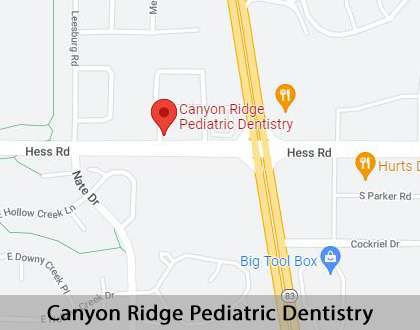Find the Best Pediatric DentistParker, CO
Finding the best pediatric dentist is essential to ensure healthy teeth in children. Regular dental visits are crucial for a child’s oral health. Pediatric dentists go through unique training to meet the dental needs of children as their teeth develop.
Pediatric dentistry is available at Canyon Ridge Pediatric Dentistry in Parker and the surrounding area. It is never too early to find a pediatric dentist. Establishing an ongoing relationship with a good pediatric dentist will ensure that the child has comprehensive and continuing dental care throughout their childhood.
Call us at 303-841-7900 to learn more or to schedule an appointment.
Who are Pediatric Dentists?
The dental needs of children are different from adults. As the body grows and develops, special care must also be given to the growth and development of the teeth. Pediatric dentists, also known as pedodontists, specialize in the care of children’s teeth from infancy through adolescence.
Pediatric dentists must undergo additional training to practice pedodontics. Following four years of dental school, they must complete two additional years of residency training in pediatric dentistry. They must then take a series of exams to become board certified.
“Pediatric dentists, also known as pedodontists, specialize in the care of children’s teeth from infancy through adolescence.”
Why Pediatric Dentistry?
Beginning proper dental care at an early age can help prevent dental issues that can last a lifetime. The American Academy of Pediatric Dentistry (AAPD) recommends that children begin seeing a pediatric dentist about six months after their primary teeth begin growing in, or no later than the age of one. Pediatric dentists can help the family establish a good oral care routine, make sure the child’s teeth and jaws are developing properly, and watch for common dental problems that can lead to bigger issues later in life. For example, prolonged thumb sucking can cause the teeth to become misaligned and even lead to speech impediments.
Since pediatric dentists also study child psychology, they are skilled in communicating with children in an effective and non-threatening way. This can help children be less fearful of dental procedures and dental visits in general.
“The American Academy of Pediatric Dentistry (AAPD) recommends that children begin seeing a pediatric dentist about six months after their primary teeth begin growing in.”
Resources to Use
For individuals to find a pediatric dentist in their area, they should ask a pediatrician or general dentist for a referral. Friends or relatives with young children may also have good recommendations. If an individual has dental insurance, check to see which pediatric dentists are in-network.
It is always a good idea to read reviews before making an appointment with a new pediatric dentist. Check their website to see if they have reviews listed. Yelp and Google are good sources of reviews. Also, a number of sites on the internet are specifically geared toward reviews of dental and medical professionals.
“It is always a good idea to read reviews before making an appointment with a new pediatric dentist.”
Check out what others are saying about our dental services on Yelp: Find the Best Pediatric Dentist in Parker, CO
Finding the Right Fit
It is important to find a pediatric dentist that both the parent and the child are comfortable with, especially for children with special needs. Many kids have anxiety about going to the dentist, so look for a kid-friendly atmosphere. Take a look at the dentist’s website and see if it features pictures of the office. Call the office and ask to come in for a tour before scheduling an appointment. Many pediatric dentists are happy to meet prospective patients ahead of time to ensure they are a good fit for their needs.
Pay attention to how the dentist interacts with patients, and notice whether they use words children can understand and put them at ease. Good pediatric dentists often explain what they are going to do ahead of time. They let the patient see how things work and find ways to make treatment fun.
“Many pediatric dentists are happy to meet prospective patients ahead of time to make sure they are a good fit for the patient’s needs.”
Questions Answered on This Page
Q. How long does it take to become a pediatric dentist?
Q. When should children start going to the dentist?
Q. How do I choose a pediatric dentist?
Q. How do I find the right dentist for my child?
Q. What questions should I ask my pediatric dentist?
People Also Ask
Q. How are dental sealants applied to teeth?
Q. How can I prepare my child for their first dental visit?
Q. What type of special training do pediatric dentists receive?
Questions to Ask a Potential Provider
Do not hesitate to talk to several different pediatric dentists before making a final decision. The dentist will be providing dental care for the patient's family for many years, so it is important to have a good rapport.
- Are they board-certified?
- Are they a licensed member of the American Academy of Pediatric Dentistry?
- Do they have experience working with patients with special behavioral or emotional needs?
- How many years of experience do they have?
- What should a patient expect for the first visit?
- What steps do they take to make patients feel more comfortable?
“Do not hesitate to talk to several different pediatric dentists before making a final decision.”
Frequently Asked Questions
Q. What services does a pediatric dentist provide?
A. Pediatric dentists provide several different dental services. They help prevent tooth decay by applying fluoride treatments and educating children and parents about good home dental care. They take X-rays to help diagnose current dental issues or predict future oral health problems. They can treat oral trauma, such as broken teeth or pulp damage. If primary teeth are lost early, a pediatric dentist can use space maintainers to keep adjacent teeth in the proper position.
Q. What are the most common dental problems in children?
A. Cavities are common in children, who are typically not skilled at brushing and flossing on their own. Parents should help children practice good oral care until they are old enough to properly brush on their own. Dental emergencies are also common in children, who may sustain oral injuries from playing sports, riding a bike, or other physical activities. Gingivitis and gum disease can also occur in children with poor oral hygiene.
Q. What teeth are most frequently injured in children?
A. The upper front teeth in children are most likely to sustain an injury, especially in children with excessive overjet. An overjet is a dental condition in which the upper teeth protrude outward at an angle. Children with an overjet should wear a mouthguard during contact sports or other activities where teeth could be injured.
Q. Is it necessary to fill cavities in baby teeth?
A. Even though a child’s baby teeth, or primary teeth, begin to fall out around the age of six, cavities in baby teeth should be taken just as seriously as cavities in permanent teeth. If left untreated, dental cavities can cause pain and discomfort. They can also lead to other dental problems, such as infection. Healthy teeth are also needed for children to eat and speak properly.
Q. Do cavities in primary teeth affect permanent teeth?
A. Yes, cavities in primary teeth can affect the growth and development of permanent teeth. If left untreated, cavities can lead to an infection, which can spread into the bone. Permanent teeth, which are still developing, can become infected in this bacteria-rich environment. Have any cavities treated by a pediatric dentist as soon as possible, even if they occur in a primary tooth.
Quality Pediatric Dental Services Can Transform Smiles
By visiting us as soon as possible, our team can help get your child the professional treatment they need.
Definition of Pediatric Dental Terminology
Contact us for children’s dentistry needs
Tooth decay early in life, even if it occurs in primary teeth, can have a lasting effect on a child’s long-term dental health. Poor oral health in childhood has been associated with absenteeism from school and poor academic performance. Take the time early to find a dentist who can provide ongoing, quality dental care throughout a child’s early years.
Call us at 303-841-7900 to learn more or to schedule an appointment.
Helpful Related Links
- American Dental Association (ADA). Glossary of Dental Terms. 2023
About our business and website security
- Canyon Ridge Pediatric Dentistry was established in 2012.
- We accept the following payment methods: American Express, Cash, Check, Discover, MasterCard, Paypal, and Visa
- We serve patients from the following counties: Douglas County
- We serve patients from the following cities: Parker, Centennial, Castlewood, Southglenn, Castle Rock, and Highlands Ranch
- Healthgrades. View Background Information and Reviews
- Norton Safe Web. View Details
- Trend Micro Site Safety Center. View Details







